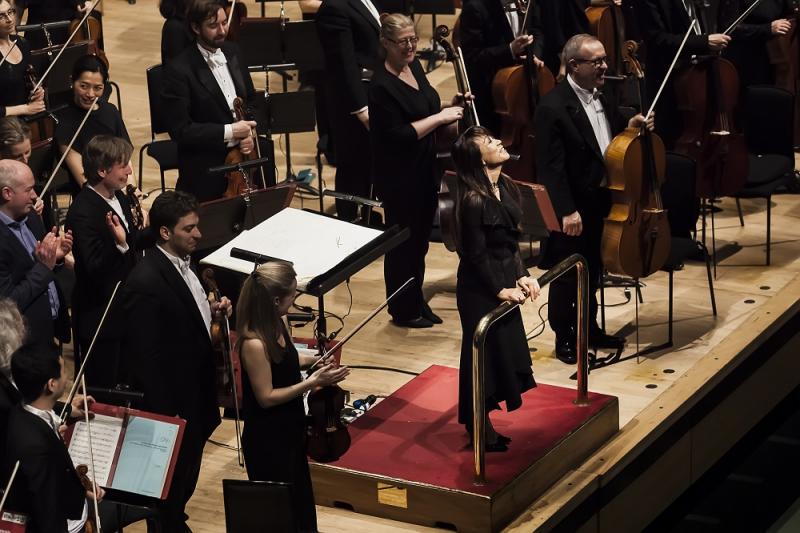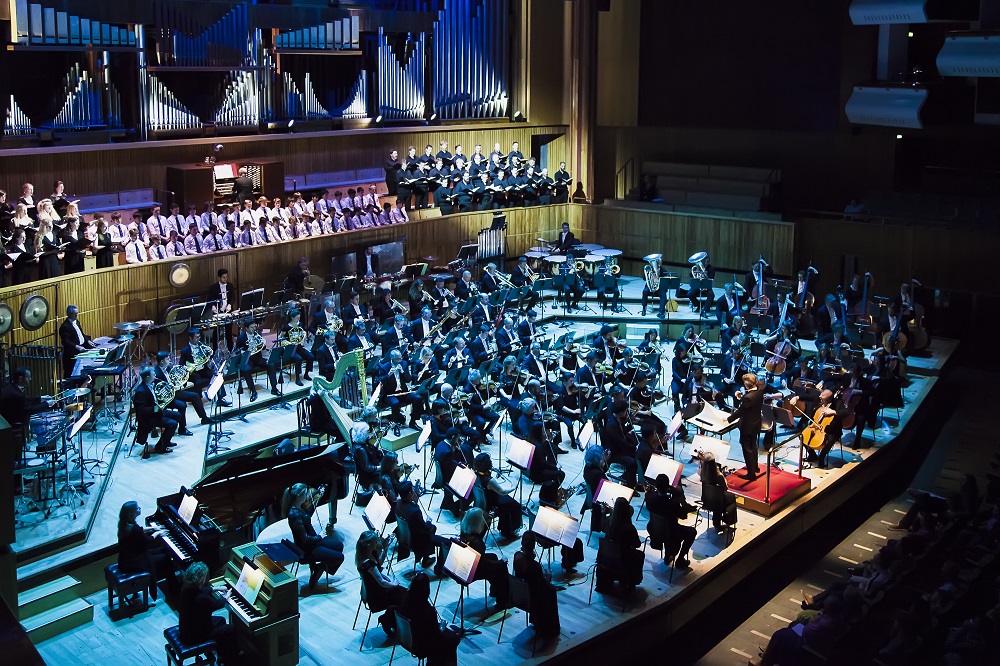Philharmonia, Salonen, RFH review – cosmic perspectives | reviews, news & interviews
Philharmonia, Salonen, RFH review – cosmic perspectives
Philharmonia, Salonen, RFH review – cosmic perspectives
Unsuk Chin explores man’s relation to the universe in new oratorio

Space is big – that seems to be the message of Unsuk Chin’s new oratorio Le Chant des Enfants des Étoiles. The work sets texts, ranging from the Baroque to the present day, concerned with space and scale.
Despite the huge number of instruments, this is primarily a choral work. Most of the choral writing is based on simple lines, but elaborated with continuous ornamentation to create complex, scintillate textures. The orchestral writing is mercurial and mainly focused on the percussion section, with the rest of the ensemble often seeming underused. But the percussion writing more than compensates, with continually imaginative effects, like paired antiphonal tubular bells, interchanging across the stage, or a thunder sheet blending into the decay from an organ pedal.
Chin is clearly comfortable working on such a large scale, and the 40-minute duration of the work was fully justified by the breadth of the conception. The 12 movements are grouped into two halves, the first of which gradually grows from a quiet opening to a central climax. The texts here include poems by the Portuguese poet Fernando Pessoa and the Scandavaians Edith Södergran and Eeva-Liisa Manner. The second half moves into English metaphysical territory with Henry Vaughan and William Blake, as well as the Spanish poet Juan Ramón Jiménez. Chin seems blissfully unconcerned with the meter of the language (mostly English, some Spanish), the texts informing the mood of the music, but sung to sometimes awkward rhythms, as dictated by the innovative choral textures. That must make it tough to sing, but the Philharmonia Voices and the Trinity Boys Choir did an excellent job. Chin makes no concessions to the boy choristers, regularly dividing the children's choir into separate contrapuntal lines, as well as giving them a highly exposed solo number (in Spanish, too). Esa-Pekka Salonen led a committed and vibrant performance from the Philharmonia – this was the European premiere, following a first performance in Seoul in 2016 – the orchestra yet again demonstrating its unsurpassed credentials in new music.
That must make it tough to sing, but the Philharmonia Voices and the Trinity Boys Choir did an excellent job. Chin makes no concessions to the boy choristers, regularly dividing the children's choir into separate contrapuntal lines, as well as giving them a highly exposed solo number (in Spanish, too). Esa-Pekka Salonen led a committed and vibrant performance from the Philharmonia – this was the European premiere, following a first performance in Seoul in 2016 – the orchestra yet again demonstrating its unsurpassed credentials in new music.
Salonen chose an eccentric first half to complement the new work. The concert opened with Biber’s Battalia. That’s the one with the dissonant movement where all the violins play in different keys. The violinists stood, in a Baroque formation around the continuo harpsichord, and played in a relatively unadorned period style, but the piece was present as little more than the curiosity it is. Beethoven’s Second Symphony followed, in a broad and opulent reading. Some of the first movement felt a little too comfortable, lacking in rhythmic urgency, but when this mood continued into the Larghetto second, it proved ideal. The finale was impressive too, still with broad textures, but now at a brisk pace and with ideal rhythmic focus.
As interesting as the concert itself was the recital before, part of the Philharmonia’s "Music of Today" series. The short performance showcased the young Slovenian composer Vito Žuraj. His sounds are avant-garde and experimental, but always with an anarchic or humorous angle – shades of Ligeti, but even more absurd. Of the three pieces, the highlight was the song cycle Ubuquity, based on Jarry’s Ubu Roi. Soprano Nika Gorič was called on to sing, speak, growl, bleat ... you name it, while the ensemble produced a similar range of sounds beneath her, the potential chaos skilfully corralled by conductor Joana Mallwitz. The performance showed an impressive commitment from both to this radical new music, and indeed from Salonen himself, who, the programme informed us, had personally contributed to the financing of the pre-concert event.
rating
Share this article
The future of Arts Journalism
You can stop theartsdesk.com closing!
We urgently need financing to survive. Our fundraising drive has thus far raised £49,000 but we need to reach £100,000 or we will be forced to close. Please contribute here: https://gofund.me/c3f6033d
And if you can forward this information to anyone who might assist, we’d be grateful.

Subscribe to theartsdesk.com
Thank you for continuing to read our work on theartsdesk.com. For unlimited access to every article in its entirety, including our archive of more than 15,000 pieces, we're asking for £5 per month or £40 per year. We feel it's a very good deal, and hope you do too.
To take a subscription now simply click here.
And if you're looking for that extra gift for a friend or family member, why not treat them to a theartsdesk.com gift subscription?
more Classical music
 From Historical to Hip-Hop, Classically Black Music Festival, Kings Place review - a cluster of impressive stars for the future
From quasi-Mozartian elegance to the gritty humour of a kitchen inspection
From Historical to Hip-Hop, Classically Black Music Festival, Kings Place review - a cluster of impressive stars for the future
From quasi-Mozartian elegance to the gritty humour of a kitchen inspection
 Shibe, LSO, Adès, Barbican review - gaudy and glorious new music alongside serene Sibelius
Adès’s passion makes persuasive case for the music he loves, both new and old
Shibe, LSO, Adès, Barbican review - gaudy and glorious new music alongside serene Sibelius
Adès’s passion makes persuasive case for the music he loves, both new and old
 Anja Mittermüller, Richard Fu, Wigmore Hall review - a glorious hall debut
The Austrian mezzo shines - at the age of 22
Anja Mittermüller, Richard Fu, Wigmore Hall review - a glorious hall debut
The Austrian mezzo shines - at the age of 22
 First Person: clarinettist Oliver Pashley on the new horizons of The Hermes Experiment's latest album
Compositions by members of this unusual quartet feature for the first time
First Person: clarinettist Oliver Pashley on the new horizons of The Hermes Experiment's latest album
Compositions by members of this unusual quartet feature for the first time
 Gesualdo Passione, Les Arts Florissants, Amala Dior Company, Barbican review - inspired collaboration excavates the music's humanity
At times it was like watching an anarchic religious procession
Gesualdo Passione, Les Arts Florissants, Amala Dior Company, Barbican review - inspired collaboration excavates the music's humanity
At times it was like watching an anarchic religious procession
 Classical CDs: Camels, concrete and cabaret
An influential American composer's 90th birthday box, plus British piano concertos and a father-and-son duo
Classical CDs: Camels, concrete and cabaret
An influential American composer's 90th birthday box, plus British piano concertos and a father-and-son duo
 Cockerham, Manchester Camerata, Sheen, Martin Harris Centre, Manchester review - re-enacting the dawn of modernism
Two UK premieres added to three miniatures from a seminal event of January 1914
Cockerham, Manchester Camerata, Sheen, Martin Harris Centre, Manchester review - re-enacting the dawn of modernism
Two UK premieres added to three miniatures from a seminal event of January 1914
 Kempf, Brno Philharmonic, Davies, Bridgewater Hall, Manchester review - European tradition meets American jazz
Bouncing Czechs enjoy their Gershwin and Brubeck alongside Janáček and Dvořák
Kempf, Brno Philharmonic, Davies, Bridgewater Hall, Manchester review - European tradition meets American jazz
Bouncing Czechs enjoy their Gershwin and Brubeck alongside Janáček and Dvořák
 Solomon, OAE, Butt, QEH review - daft Biblical whitewashing with great choruses
Even a top soprano and mezzo can’t make this Handel paean wholly convincing
Solomon, OAE, Butt, QEH review - daft Biblical whitewashing with great choruses
Even a top soprano and mezzo can’t make this Handel paean wholly convincing
 Two-Piano Gala, Kings Place review - shining constellations
London Piano Festival curators and illustrious friends entertain and enlighten
Two-Piano Gala, Kings Place review - shining constellations
London Piano Festival curators and illustrious friends entertain and enlighten
 Echo Vocal Ensemble, Latto, Union Chapel review - eclectic choral programme garlanded with dance
Beautiful singing at the heart of an imaginative and stylistically varied concert
Echo Vocal Ensemble, Latto, Union Chapel review - eclectic choral programme garlanded with dance
Beautiful singing at the heart of an imaginative and stylistically varied concert
 Scott, Irish Baroque Orchestra, Whelan, RIAM, Dublin review - towards a Mozart masterpiece
Characteristic joy and enlightenment from this team, but a valveless horn brings problems
Scott, Irish Baroque Orchestra, Whelan, RIAM, Dublin review - towards a Mozart masterpiece
Characteristic joy and enlightenment from this team, but a valveless horn brings problems

Add comment